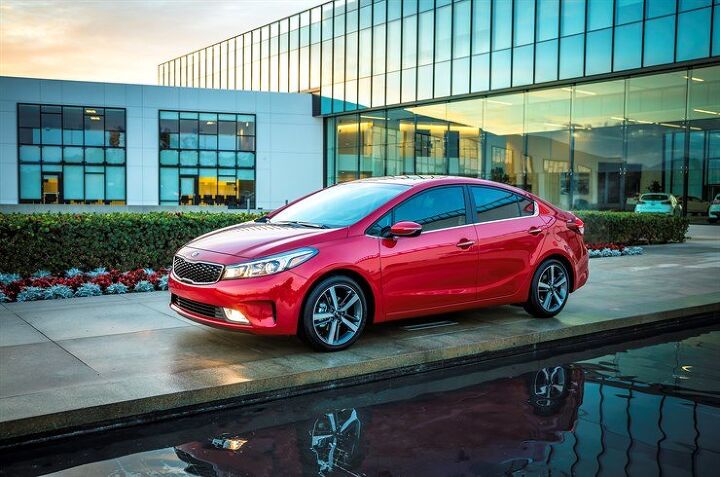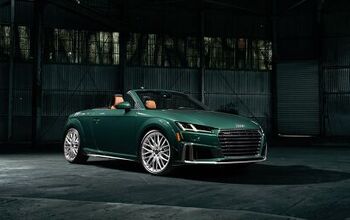New Car Dealerships Are Taking a Page From the Buy-here/Pay-here Playbook and Giving It an Evil Twist

Is there any lower form of life in the automotive biosphere than the buy-here-pay-here dealership operators?
It’s hard to see them as anything other than rent-seeking scumbags who inflate the market for inexpensive used cars, then turn around and sell those used cars to the poorest and most unfortunate members of our society for prices that are often multiples of the acquisition cost. There is literally no ethical reason for them to exist; most of the time the “down payment” charged by these dealers is more or less the true value of the car. Everything that comes afterwards is just tasty cake topping — and if the working mother or fixed-income older person buying from them misses the very last weekly payment, they can repossess the car and sell it all over again on the same ridiculous terms.
In a world without buy-here-pay-here dealers, the transaction prices of low-cost cars would eventually settle to the point where they could be bought for the “down payments” being handed over today. In fact, I’ve heard BHPH operators brag about making money on the down payment alone. The difference between one of these people and the victims of their operations, of course, is that the former has access to capital and an entry into the protected world of auto auctions.
You’ll often hear these dealers tell stories about how they “help their community.” The members of the community, of course, know better. They can see the BHPH dealers living high on the hog many miles away from the low-income areas in which the lots are deliberately placed right next to liquor stores and lottery ticket providers. So it’s no wonder they feel no sense of loyalty to their “dealers” and will often make the cars disappear without further payment if they can. To combat this, the BHPH people will often have remotely-operated ignition blocks installed into their vehicles. If you don’t make the payment, or if the dealer fails to record the payment correctly, your car is shut off — regardless of where you are or what you need to do with the car next. If you don’t deal with the bottom feeders of the auto biz, you’ve probably never seen one.
That might be about to change.
Consider the following scenario: You sign a four-year lease on a Kia Forte. Then your circumstances change and a family member ends up paying the lease off and buying the car outright for you in an effort to be helpful. You pay a $300 fee just for the privilege of buying the car out, but then the dealer tells you that you owe them an additional $200 fee. When you refuse to pay that dealer fee, your car, which you legally own, refuses to start. Why? Simple. There’s a dealership-owned, GPS-enabled ignition interrupt switch in the car.
That’s exactly what happened to Daniel Lallier, who leased a Kia Forte from Kia Sherbrooke in Quebec.
Lallier signed a four-year lease for a Kia Forte LX back in May from Kia Sherbrooke. Two months later, the 20-year-old’s grandmother offered to buy the car outright when he lost his job and couldn’t make his weekly payments.
After settling the balance and paying a $300 penalty, Lallier said, the dealership told him he would have to pay an additional $200 to remove a GPS tracker that had been installed on the car.
The device allows dealers to remotely immobilize a car in case lease payments are in arrears. Lallier said there was no mention of the removal fee in the contract and he disputed having to pay it.
Let’s get the easy part out of the way: If you’re leasing a new Kia when you are 20 years old and not in possession of a steady job, you’re not the brightest bulb. And if your grandmother has to bail you out of the problem, you’re probably not the pride and joy of your extended family. Still, from the perspective of the dealership this fellow is a solid customer. He paid off the car early and also paid the early termination fee. Which probably explains why they decided to go after him for the extra $200.
In the end, however, Kia Sherbrooke had to remove the box at no charge because they apparently had no contract language to support the removal fee. Which leads to the reasonable question: Why was the ignition box there in the first place? It turns out that starter-interruption boxes are commonplace in Canada, and not just among the JD Byriders of their market. Mainline dealers use them to get credit approval for subprime customers. Since the average American has below-average credit, expect to see this practice become popular south of the border as well.
From a consumer-protection standpoint, these boxes and the financing schemes that spawn them are utterly pernicious. They raise the price of used vehicles by throwing more available “credit” at them, leading more rent-seeking subprime financiers to get involved in the game, which further raises prices without adding value to the customer. The net long-term result is that people in all economic situations are paying more money for used cars because there are unwanted and unpleasant entities wetting their proverbial beaks.
But maybe none of that applies to you. Maybe you’re an 820-credit-score-beacon member of America’s privileged class. Maybe you’re that mythical personal finance mastermind who always pays cash for a lightly-used Toyota. So why give a damn about it, if you aren’t a credit criminal yourself and have no plans of ever becoming one? Well, here’s the kicker; these boxes are often activated while the car is on the move, as shown in court testimony. The more commonplace they become, the more likely you are to be around one of them when the ignition circuit breaks and the car to which it is attached comes to a sudden and frightening halt, likely accompanied by much swerving and dangerous agitation on the part of the driver.
I’d encourage you to contact your local legislators and tell them that ignition-interrupt switches are just the camel’s nose of a system that preys disproportionately on the poor, the uneducated, and the uninformed. If you don’t, then you might want to be careful the next time you’re next to a late-model Forte on the road. You might not have any involvement in subprime financing, but that doesn’t mean it cannot become involved with you.
[Image: Kia Motors]

More by Jack Baruth
Latest Car Reviews
Read moreLatest Product Reviews
Read moreRecent Comments
- Akila Hello Everyone, I found your blog very informative. If you want to know more about [url=
- Michael Gallagher I agree to a certain extent but I go back to the car SUV transition. People began to buy SUVs because they were supposedly safer because of their larger size when pitted against a regular car. As more SUVs crowded the road that safety advantage began to dwindle as it became more likely to hit an equally sized SUV. Now there is no safety advantage at all.
- Probert The new EV9 is even bigger - a true monument of a personal transportation device. Not my thing, but credit where credit is due - impressive. The interior is bigger than my house and much nicer with 2 rows of lounge seats and 3rd for the plebes. 0-60 in 4.5 seconds, around 300miles of range, and an e-mpg of 80 (90 for the 2wd). What a world.
- Ajla "Like showroom" is a lame description but he seems negotiable on the price and at least from what the two pictures show I've dealt with worse. But, I'm not interested in something with the Devil's configuration.
- Tassos Jong-iL I really like the C-Class, it reminds me of some trips to Russia to visit Dear Friend VladdyPoo.


































Comments
Join the conversation
So I exercised a little Google-fu and it turns out these little big brother AVL devices are pretty easy to remove. Why even bother with the dealer. Tell them to pound sand with that fee and just cut the thing out. If your contract obligates you to have it but you aren't a big fan of some sleazeball knowing your movements; you could probably even put the antenna in a Faraday cage to disable the GPS tracking of where you are. Technically you didn't modify and/or remove squat. Personally I'd rather just buy a cheap car of Craigslist then deal with a BHPH lot.
Funny most of the guys I saw hitting up BHPH places in my lifetime were young dumb privates buying up V6 mustangs, I4 Wranglers, straight piped junk 4x4 trucks, and V6 newer model F150s for 6x book and 30% interest from that really nice "former Sgt. Major" at the dealership right outside the main gate on any CONUS post.